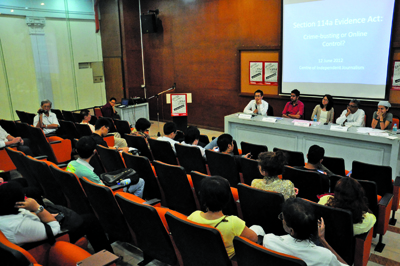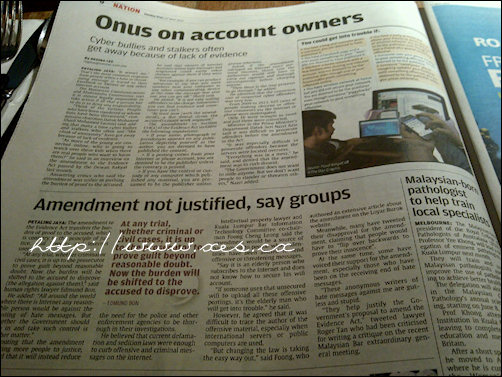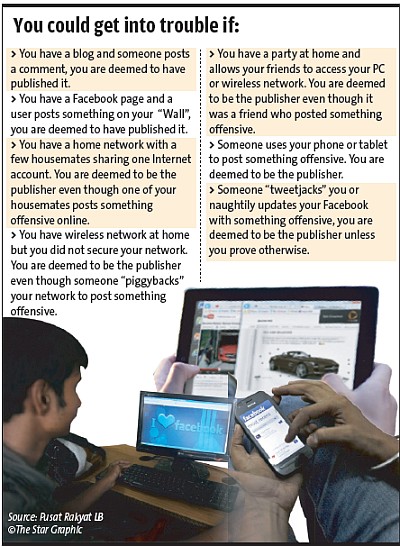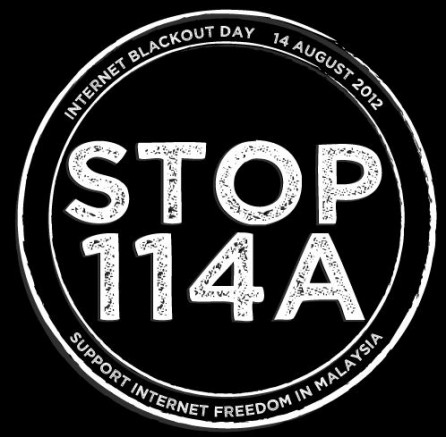
As some of you have seen from my previous postings about my media features regarding the Evidence (Amendment) (No. 2) Act 2012, Central of Independent Journalism (CIJ), A. Asohan (Digital News Asia), myself and many others have been quite active in trying to get this new law repealed (See my “Grave Repercussions for Internet Users” article). This campaign is famously known as the #stop114A campaign.

Forum on “Section 114A Evidence Act: Crime-busting or Online Control” at the Chinese Assembly Hall on 12 June 2012. It was my first time meeting people from CIJ. CIJ gave me RM300 as a token of appreciation. I donated part of it back to them. I think I should donate any monetary tokens back to non profit organisations next time.
After all the talks and media features, we took a bigger step. We went to Parliament to meet with Members of Parliament to persuade them to revoke this law. Thanks to CIJ, Jac Sm Kee, A. Asohan and I managed to meet some important people.
I’ve never thought that I will ever enter Parliament compound or even lobby for a law to be revoked. It was certainly a unique experience.
Getting into Parliament was surprisingly quite easy. All I had to say is that I have a meeting with so and so and hand them my identity card. There was no body search or even car search. I guess it’s not necessary since Malaysia is relatively a peaceful country.
I saw some politicians that I always see on TV, such as our Deputy Prime Minister and former Penang Chief Minister.

Inside the old Parliament
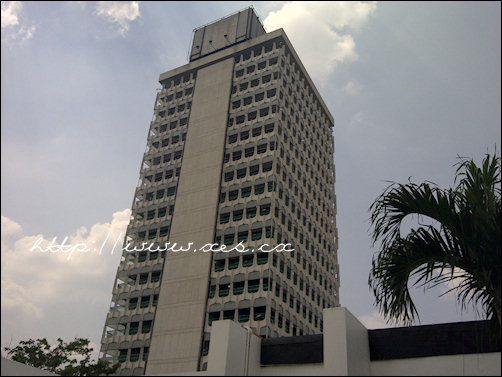
Iconic building
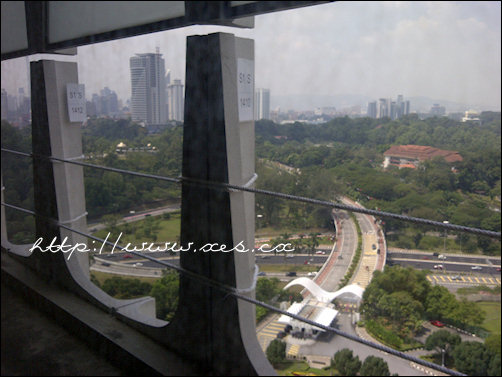
View from inside the iconic building
The compound wasn’t really big either. The iconic building is actually offices. The Dewan Negara and Dewan Rakyat are at another building behind it. One of the MPs (whom I know from a case which I did. He was my opponent) brought me into Dewan Rakyat to watch the proceedings. I was checking out the computers of the MPs and none of them were on Facebook.
CIJ initiated an online petition to call for the withdrawal of the new law. It had over 3000 signatures and it had to be presented before the Parliament session ends.
CIJ managed to fix a meeting with de facto Law Minister Dato’ Seri Mohamed Nazri for us to present the petition. However, it was called off few minutes before the event.
We presented the petition on the next day to the Deputy Law Minister Datuk VK Liew at the media corner of Parliament. It’s a small corner for MPs to do their press conferences.
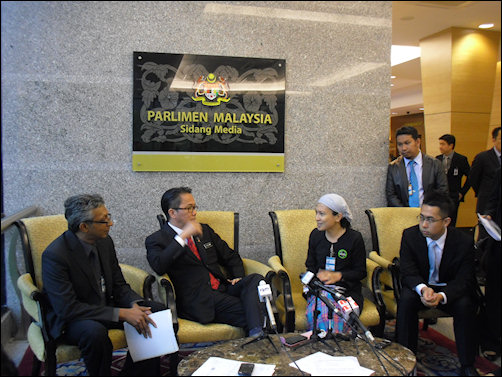
At the media conference..
VK Liew (to me): You Bar Council?
Me: No, KL Bar.
VK Liew: No, you’re Bar Council!
Me: -_-|||
While commenting on the Bill..
VK Liew: Bar Council should get professional advice..
Me: -_-|||
We persuaded Datuk VK Liew to rethink about this law but unfortunately, he wasn’t receptive about it and played it down by calling our fears “misplaced”.
“Burden of proof is still on the prosecution!”
“But that is after you are arrested and charged!”
“That’s a different issue!”.
-_-|||
Days later, CIJ managed to fix a meeting with the opposition MPs for us to brief them about the new amendments. Jac Sm Kee and I briefing Sivarasa, Nurul Izzah, Fong Poh Kuan and a few others on the repercussions of the new law.
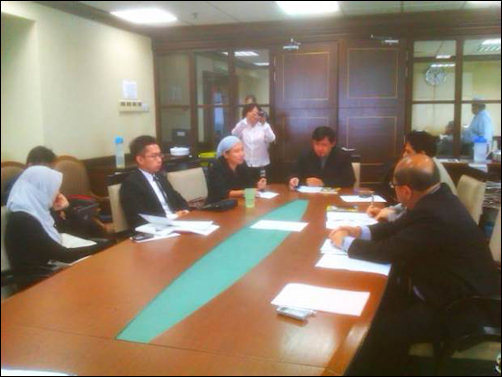
Meeting with Pakatan MPs at the “Bilik Pembangkang” in Parliament
We were fortunate that the opposition coalition took our position and called for the new amendments to be revoked. Unfortunately, the coverage was weak. Only Free Malaysia Today and Malaysiakini covered this story. Weeks ago, we briefed the Pakatan senators on the law. It went well. The senators expressed their intention to help.
Things took a turn when Liew of Cari Internet came on board to support #stop114a. Liew and I had dealings together when I was in my old firm.
CIJ called me a meeting to discuss in 12 July 2012. The response was lukewarm. It was probably about 12 people and most of them were from CIJ and NGOs. Cari Internet was the only non-NGO. During the discussion, the idea of Internet Blackout Day – a virtual strike when several U.S. sites protested the Protect IP Act (PIPA) and Stop Online Piracy Act (SOPA) – was brought up and adopted by us.
In this Internet Blackout Day, we decided that participating websites will have a popup highlighting the effects of 114A. We managed to get Malaysiakini, BFM and a few other prominent websites involved. Soon, well known online personalities like Sultan Muzaffar and Nikicheong came on board.
I first met Sultan Muzaffar when we shot the Astro B.yond TVC in January 2010. I met him again at Timothy Tiah & Audrey’s wedding. I told him about our intention to organise the Internet Blackout Day. He agreed without hesitation. If you haven’t realise, Sultan Muzaffar has more than 200,000 followers on Twitter!
3 days before our Internet Blackout Day, National Young Lawyers Committee, CIJ and LoyarBurok jointly organized a forum on 114A at the Bar Council. Deputy Minister of the Ministry of Higher Education, Dato Saifuddin Abdullah, lawyers Faisal Moideen and K Shanmuga and myself were invited as speakers. All of us except Faisal were against 114A. Faisal on the other hand was not against 114A but said that one part of the section is too wide.
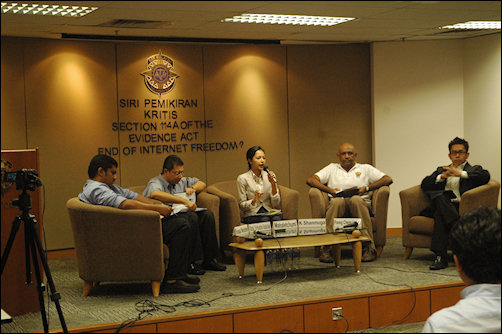
The participants were given a chance to vote before and after the talk ie whether in support of 114A or not. Before the event, 30 over people is against 114A but 6 is in support. After the talk, 50 over people voted against 114A and none supported 114A!
The good news for me is that Dato Saifuddin Abdullah has mentioned that he will rally his fellow BN members to act against 114A.
On 13 August 2012, we probably had about 20 participating websites. The Stop114A Facebook group had only 400 likes. By evening of 13 August 2012, Twitterjaya was buzzed with the #stop114a hashtag. By midnight, participating websites activated the #stop114A popup and banners. More websites started to join the cause. Someone even created a Wikipedia page to mark this event.
The response started to grow and eventually it exploded! By midnight of 14 August 2012, the Stop114A Facebook group had 43,000 likes.
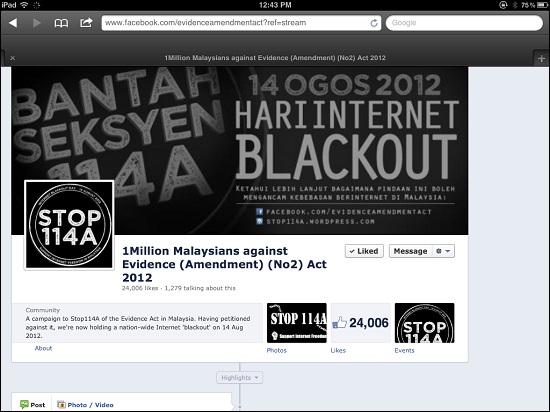
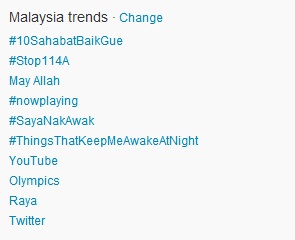
It was number 2 on the Malaysia Twitter trending list. It’s should be number 1 on the Malaysia Twitter trends because the no. 1 trending topic was also trending worldwide.
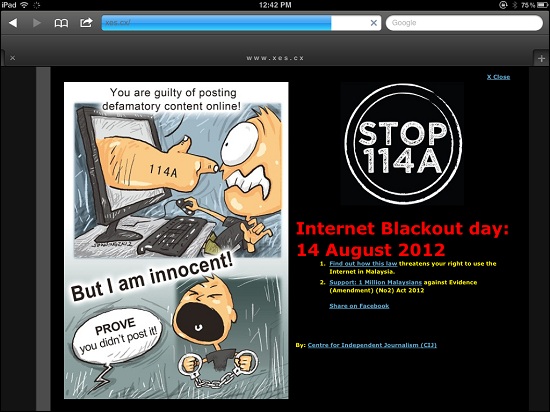
www.xes.cx participated as well.
This is probably one of Malaysia’s most successful social media campaign.
It gained so much attention that Australia, United Kingdom and United States media reported about it. I was contacted by BBC Radio to be part of a live discussion but unfortunately, when I was about to go live, they dropped by participation. I guess they had enough participants.
In the evening, Prime Minister Datuk Seri Najib Abdul Razak tweeted: “I have asked the cabinet to discuss section 114A of the Evidence Act 1950. Whatever we do we must put people first.”. It felt like victory to us but it was not enough until the amendments get repealed.
Unfortunately, weeks later the PM announced that they will keep 114A to protect the people.
Notwithstanding all these bad news, we’ve not given up. We’re still engaging various people to persuade the Government to repeal the law.
To me, this new law brought me new experience, insights and network. Lobbying for legislative changes is something I’ve never thought I would do in my legal practice.
I will update everyone again if there are any positive changes.
